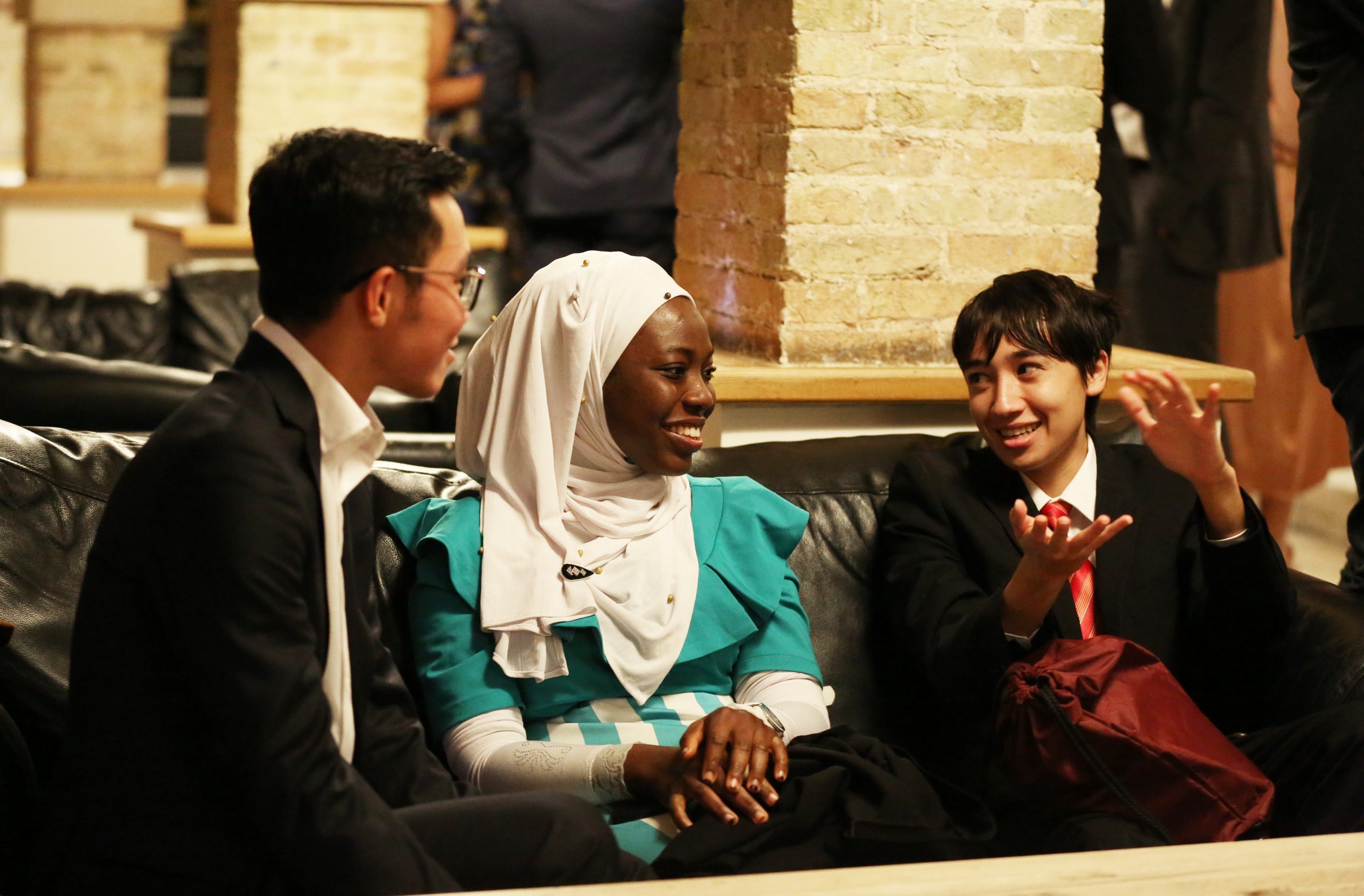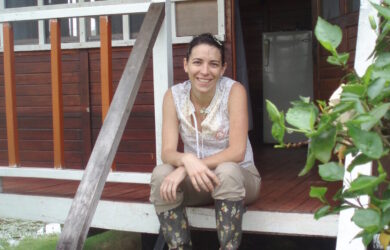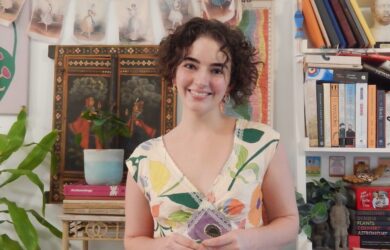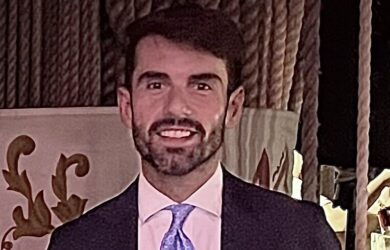
In anticipation of a 20th birthday celebration this month, we look back at how the Gates Cambridge community has developed over the last two decades
There is a unique sense of belonging in the Gates Cambridge community, that still energises me greatly - a sense of belonging not based on where we’re from, not based on our discipline, but rather a common, outward-looking, orientation to our life and work.
Halliki Voolma
As the Gates Cambridge Scholarship reaches the end of its 20th anniversary year, its alumni association is holding an event late this month which celebrates some of the factors that have shaped the scholar community.
That sense of community, of a global network of leaders, developed and owned by the scholars and alumni themselves, is at the heart of the scholarship. Jennifer Gibson [2001], one of the 2001 cohort, says: “The scholar-led nature of the community is its strength. It makes it unique. It’s a scholarship that you can make your own. It felt like we could create a real multicultural space for international friendships around a shared belief that the scholarship was more than a pay cheque, that it had a bigger purpose.”
But how did it begin and what have been the important milestones over the last two decades that have shaped what it is now?
First and foremost was the formation of the Gates Cambridge Scholars Council by the first cohort of scholars. According to Andrew Robertson [2001], one of the scholars involved, the Council was formed because some scholars wanted to better know their peers, others wanted to develop new collaborations and initiatives and others wanted to engage with the Trust about what the scholarship included. Andrew says: “For me, it seemed like a first step towards giving back to the Gates Cambridge Scholarship and harnessing the grassroots leadership and energy for which many of the Gates Cambridge scholars were chosen.”
Jennifer, who was also involved in the Council’s formation, adds that creating an inclusive space was vital and says there was also some debate at the time about whether Gates Cambridge scholars should have such a platform or should try to integrate into the university. She recalls that the first Gates Cambridge Provost, Gordon Johnson, played an important role because he operated an open-door policy and was always willing to listen to what the scholars had to say.
Developing the Council
It was important in the early days to build a sense of trust, through, for example, holding multiple town halls, creating an Advisory “Patron’s Committee” composed of several College Masters, partnering with the Graduate Union and seeking guidance from multiple Colleges, MCRs and the Trustees. There were some quick wins, such as securing vending machines and computers for the Gates Scholars Common Room. Within a year, the successful launch of the first scholars’ orientation helped to secure Council’s position as the legitimate voice of scholars.
 Orientation – which involves new scholars spending the week before they officially matriculate with their peers in the English countryside, doing a series of activities which help everyone to get to know each other – was a massive undertaking in terms of time and commitment, but it paid off and now has a fundamental role in forming a sense of community from the outset.
Orientation – which involves new scholars spending the week before they officially matriculate with their peers in the English countryside, doing a series of activities which help everyone to get to know each other – was a massive undertaking in terms of time and commitment, but it paid off and now has a fundamental role in forming a sense of community from the outset.
For Andrew, the most defining element of the Council is its role as an accelerator for scholar-led initiatives. After the Council had set up the basic structures like elections, key positions and funding streams, it focused on how it could engage scholars to explore and design new programmes. Andrew says: “Many of the initiatives that are now integral to the Gates Cambridge community took advantage of this flexibility and leveraged the Gates Council as a starting platform.“
Learning for purpose
One of these is the Learning for Purpose programme which developed out of scholar conversations about opportunities to connect academic research with the world outside academia. For Tara Cookson [2011] it was personal. She had been studying cash transfer programmes in Peru and was frustrated that the academic research showed problems in the design of the programme. “I wanted to do something that would bridge the two worlds, but I didn’t have the skills,” said Tara.
She, Toby Norman [2011], Halliki Voolma [2011], Andrea Cabrero Vilatela [2011], Victor Roy [2009] and Isaac Holeman [2013] went about building a professional development programme, with the support of other members of the Council, that would enable scholars to take the criteria – academic excellence and leadership – on which they were selected forward. The scholars researched what professional skills the university and other organisations offered and went to the Trust to pitch their ideas for a pilot programme which could deliver the skills scholars from across the scholarship spectrum might need to lead effectively and bring their academic research to bear on public opinion, policy and business.
They were given a budget and used it to cover a range of sessions on everything from public speaking and work life balance to promoting inclusive leadership. They worked, for instance, with the OpEd Project on writing and pitching articles to news media; a Scotland Yard hostage negotiator delivered a session on influence and listening; former Council president Andrew Gruen led another on using social media; and members of the University’s professional development office led a weekend workshop on leadership. The Learning for Purpose team measured their impact through surveys and reported their success to the Trust which subsequently quintupled their funding.
“It is wonderful that it was born out of something the scholars had identified,” says Tara, adding that she still uses the skills she learned through the programme today. “It is an extra tool that helps scholars live up to the mission of Gates Cambridge so that they can see their research out in the world. It complements what the University offers, but with a Gates Cambridge spin.”
Other Council initiatives that aim to help scholars develop skills such as presenting their research and public engagement include the internal symposia and, more recently, the Gates Cambridge Teach-a-thon. The latter was launched in 2021 to inspire secondary students who had been affected by Covid-related school closures and involved 27 scholars sharing their knowledge about a broad range of subjects in a series of free, interactive 20-minute taster sessions. The Teach-a-thon was part of the Gates Cambridge Year of Public Engagement, but was so successful that it will be repeated in 2022. The Year of Public Engagement developed out of the Day of Service/Day of Engagement on which Gates Cambridge Scholars took part in a range of activities with local community organisations.
Other initiatives aim to bring scholars and alumni together, for instance, the Gatesway mentoring programme which has been running since 2018, but this year saw a big increase in the number of mentors coming forward, with over 50 alumni coming forward to mentor current scholars. The Scholar magazine is another example of a scholar-alumni joint initiative. Led by the Scholars Council, who send out calls for nominations for the editorial team, the publication – which moved online in 2020 – enables scholars and alumni to write or be profiled about their research and other activities.
The Gates Cambridge Alumni Association
The Council’s formation in turn led to the establishment of the Gates Cambridge Alumni Association and the desire to continue the sense of community that the Council had nurtured. The GCAA works with the Trust’s Alumni & Events Officer, and is run by Gates Cambridge alumni. There have been some challenges reaching out to alumni, sometimes without easy solutions, particularly in the early days. The community is much more diverse as alumni quickly move on both geographically and professionally and some have little time to be part of the association due to work commitments.
 The GCAA was ‘officially’ launched at an event at the British Embassy in Washington DC in 2007 which brought together 150 Gates Cambridge alumni and several VIPs. The event took over a year of planning and relationship building with the British Council, the Embassy, the Trust and within the Gates Cambridge community itself. The partnership with the Embassy and the British Council continued for several more years and extended to partnerships with the Marshall Scholars and other programmes.
The GCAA was ‘officially’ launched at an event at the British Embassy in Washington DC in 2007 which brought together 150 Gates Cambridge alumni and several VIPs. The event took over a year of planning and relationship building with the British Council, the Embassy, the Trust and within the Gates Cambridge community itself. The partnership with the Embassy and the British Council continued for several more years and extended to partnerships with the Marshall Scholars and other programmes.
Since then there have been many more events and initiatives, including more regional events as the number of alumni in different regions has grown. They include a 2013 Gates Cambridge Alumni Emerging Leadership Summit in New Delhi, a 2014 alumni event in Australia with Nobel Laureate Professor Brian Schmidt and another in Romania in 2019 about the impact of Brexit.
Inspired by the Learning for Purpose programme, the GCAA also launched its own global personal and professional development programme in 2020. Greg Nance [2011] and Halliki Voolma directed the first year of the programme as co-leads for global personal and professional development on the GCAA Board, running successful online workshops targeted at alumni (with scholars also invited) on “the emotional habits of leaders”, “navigating career transitions” and “book publishing”. Halliki says: “Having been part of the founding team of LfP, for me it was great to come full circle and help build up a similar programme for alumni!” The programme is now being directed by Board member Sanjana Mehta [2001].
In addition, the GCAA set up the annual Gates Cambridge Memorial Lecture which celebrates the lives and legacies of all Gates Cambridge alumni who have passed away since earning their degrees. This lecture includes the Lauren Zeitels Keynote Speaker, named in honour of the late GCAA co-chair Lauren Zeitels [2006]. The first lecture was held in 2018. Rebecca Saunderson [2012], Lauren’s friend and GCAA co-chair at the time, says the aim is to celebrate Lauren’s achievements and to establish a legacy, but also “to recognise that whilst we honoured her, we also got to honour someone doing wonderful things in the world”.
She adds that since its inception the lecture “has served to bring the alumni together to foster relationships to achieve the mission of the scholarship… which would make Lauren proud.”
Gates Cambridge Trustees
As well as organising regular events and initiatives, Alumni also have a place on the Trust’s board. Andrew Robertson became the first Scholar Trustee in 2008 and was recently replaced by Julia Fan Li [2008]. He says enabling scholars to have an equal voice within the Trust is vital: “From a practical standpoint, it allows the Trust to appreciate the first-hand perspectives and experiences of a Gates Cambridge scholar and alumnus – the interviews, integration into Cambridge, balancing their degree with the Cambridge community and their career path after graduation. But even symbolically, it shows that the Trust recognises the grassroots nature of the Gates Cambridge community and considers us as co-owners of the future of the Gates Cambridge Scholarship.”
Andrew has also come full circle in his Gates Cambridge journey, now being on one of the scholarship interview panels. He really enjoys being on the other side of the interview process and gets excited for those candidates who are successful because of what lies ahead for them at Cambridge. More generally he finds the whole process inspiring. He says: “I get energised by the creativity and passion coming from the candidates.”
Looking back over the last 20 years, Halliki Voolma, current GCCA co-chair – with Alex Kong [2016] – says the sense of community that has been built is a vital part of the scholarship.
“The current month marks my 10-year anniversary of becoming a Gates scholar and the importance and uniqueness of the Gates Cambridge community is becoming ever clearer to me. Having gone through a few phases of community membership, from being an active scholar to graduating from my PhD and losing touch a bit for a couple of years, I found the community right there, ready for me to re-engage with. A global community for life.”
She adds: “There is a unique sense of belonging in the Gates Cambridge community, that still energises me greatly – a sense of belonging not based on where we’re from, not based on our discipline, but rather a common, outward-looking, orientation to our life and work. I can’t imagine a more meaningful and fulfilling community to be part of.”
*The Gates Cambridge 20th birthday party will take place online on 23rd and 24th October. The main event, open to all Gates Cambridge alumni and current scholars, will be on 23rd October (15:00-17:00 BST). Register here. Picture: orientation 2019 in the Lake District.












